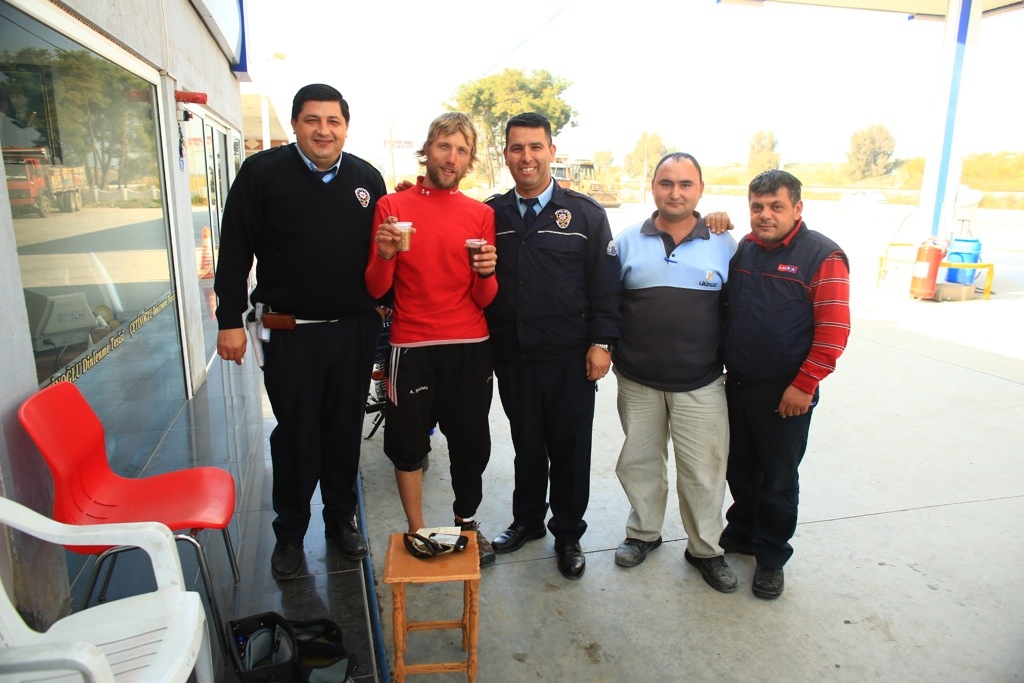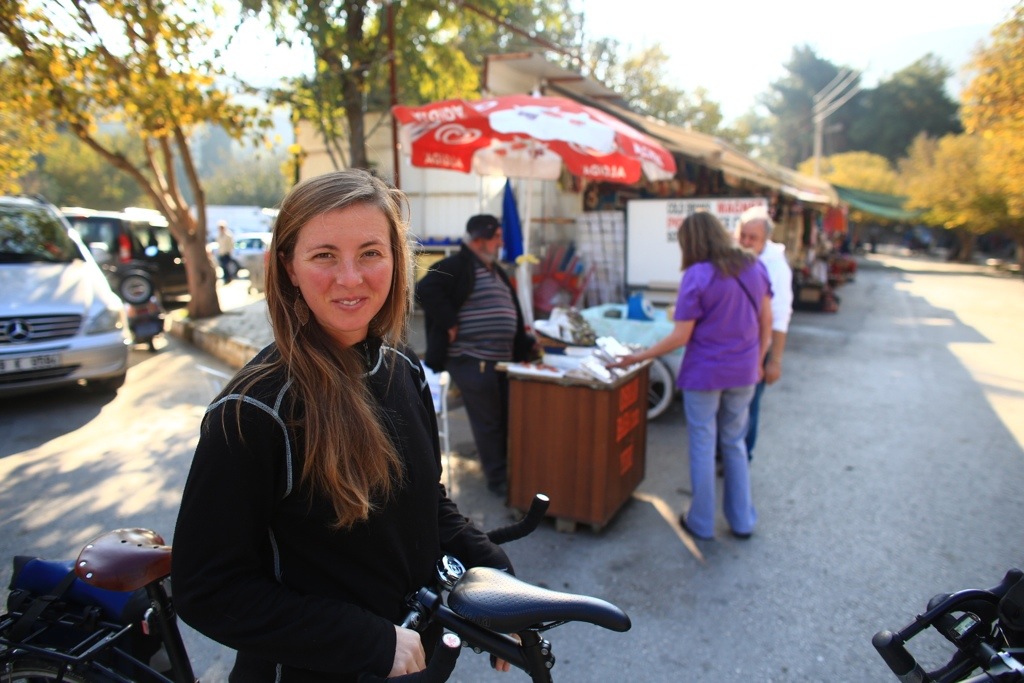So far, out of all the countries we’ve visited, the people in Greece have been the most friendly. It seems as we move eastward people have responded to us with greater and greater enthusiasm and hospitality. So naturally Kallie and I were curious how Turkey would be…
Yesterday we were humming along on the D550 toward Aydin, getting regular honks and thumbs-up’s from drivers and those seated by the road when a man stepped out from a gas station and waved us down. It was his insistency that first got me to think about stopping, but it was his police uniform that pushed me over the edge.
We pulled hard on the breaks and got our train to come to a speedy halt. What is this? I thought. He dismissed my apprehension with a wide smile, and asked in a direct and abrupt (though kind) military style: “Chai? Chai?” (“Tea? Tea?”). I looked at Kallie. Kallie looked at me. How do your refuse a police officer who’s just pulled you over? “OK, yes,” we said, and he motioned where we could put our bike. He didn’t speak much English, but enough to communicate that he wanted us to decide between Nescafe and Hot Chocolate (which all fall under the initial umbrella of “chai”–like “Coke” down south, so I’m told). We went for one each, and one of the station attendants pulled some chairs together for us and moved his motorbike. We sat there, gratefully cradling our warm drinks — milky in the clear plastic cups — and looking up agreeably at our policeman host, whose smile never waned. Without being able to communicate, we made small talk. He worked in Aydin, we were from America, on our way to Fetihye, pedaling from Germany. It’s 100 km to Mugla, then 150 to Fetihye. No, we weren’t going too fast–you can go as fast as you want on a bicycle, “No problem!” The weather? 20’s during the day, 10 at night, maybe. Lots of smiles. He looked at our Turkish cheat sheet and read the English aloud: “Ex-cuse me.”
“Ah, affedersiniz”
We finished our drinks and knew we needed to get back on the road, but not before a picture first. We exchanged contact information, which I later thought might be to our advantage if we ever ran into trouble — we could Facebook a Turkish traffic police officer! Mustafa was his name, and we left him with a wave and a warm feeling inside that perhaps the world is a pretty good place.
Mustafa is the man in the middle; no, we didn’t intentionally arrange by height
For us it was good timing, because we left Selçuk with a more uneasy feeling. Selcuk is where you can find ruins of the ancient city of Ephesus. In Selcuk you get the feeling that if someone were to flag you down, it would be because you look just like the hundreds of tourists they see each week, and they might be able to find a way to squeeze a Lira ($) out of you. At least that’s the feeling we both got when Falco flagged us down from his car the night we finally rolled in in the dark–dirty, road-weary, beat, hungry, and not-in-the-mood. “Where are you from? Do you have a place to stay? I have nice rooms, a big garden to park your bicycle…” At first we were just being polite, but as we listened I realized that we only had one hotel to go to and the prices he was offering us were better than those quoted on line by this establishment.
We ended up staying at the Artemis Guest House otherwise known as “Falco’s place,” and it was fine. Our biggest complaint was that the hot water 24hrs a day was more like a warm trickle–fairly dissatisfying to cold, dirty bikers who do little but dream about hot showers. He was fair, and nice, but we were divided over whether he was kind. I would call him kind in service of his business. Which perhaps is not true kindness… but that is a discussion for beer and french fries and hours. He offered to give us a ride to Ephesus, and to accompany him to the neighboring city of Kusadasi, and made repeated offers to join him for a drink in the bar. But we weren’t sure if they were offers of kindness or business transactions in the making. In the mornings he gave us coffee and never charged us for it, and we spent three nights there.
It was hard for us in Selcuk. Prices for fruit were double what we found elsewhere, and our first dinner at the restaurant was more than we paid for two nights at the hotel. We were giving ourselves some time to get used to things, but we could tell that this was not a normal town. It wasn’t that everyone was greedy or deceptive, but the feeling was just all the way around more wary. Even the kids that laughed and looked at our bicycle didn’t seem like they were doing it with any desire to engage us as people, but more with a touch of derision, as if we were passing by for their personal amusement.
Kallie, non-plussed about the negative effects of tourism
This is difficult, but not hard to understand. How many tourists go by and take a picture of the Turkish people to show their families and friends? How many foreigners pass by these kids each day for their own amusement? Tourism presents its own set of challenges for human interaction. I think these challenges are significant, and also extremely dangerous to people’s souls, and to the spirit of a place. Each experience of being objectified leads to a hardening of the heart, and a prejudice toward the next interaction. Kallie refused an invitation to tea from a merchant whom she later confessed she thought was genuine. I ignored several people calling to us from the roadside because I just didn’t want to engage. The merchants who don’t care realize that a foreign face is an automatic chance to cheat on prices. This is a snowball effect that might end in a giant crushing boulder, if not actively resisted. And active resistance is simple: look, smile, engage the person. Active resistance to this danger of human objectification and heart-hardening grows with genuine kindness.
That’s why we were so grateful to be pulled over by Mustafa the policeman. Nothing was expected of us. It was a breath of fresh air. It was a softening of our hearts. It was an oblivious and unaffected act of true defiance to this Touristic Sclerosis, this dividing wall of hostility. We are active in shaping our world. We are agents in forming our hearts. The question of what kind of world and what kind of souls we wish to carry with us through the world we cultivate is ours to answer. Let’s catch up to Mustafa and walk together on the path of genuine kindness — I think it’s a good one.
Confidence with humility; sincerity and love


